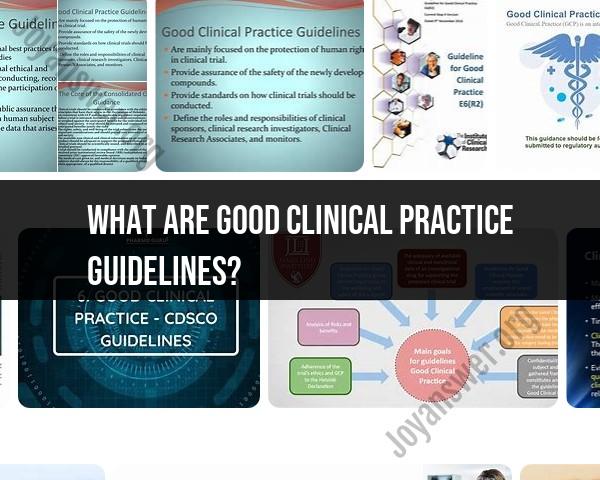What are good clinical practice guidelines?
Good Clinical Practice (GCP) guidelines are a set of international ethical and scientific standards that provide a framework for the design, conduct, performance, monitoring, auditing, recording, analysis, and reporting of clinical trials involving human subjects. The primary goal of GCP is to ensure the protection of the rights, safety, and well-being of trial subjects and to generate reliable and credible clinical trial data.
Key features and principles of Good Clinical Practice guidelines include:
Ethical Conduct:
- GCP emphasizes the importance of ethical conduct in clinical trials. This includes obtaining informed consent from participants, ensuring their voluntary participation, and protecting vulnerable populations.
Protocol Development:
- The guidelines stress the need for a detailed and scientifically sound protocol for each clinical trial. The protocol should outline the study objectives, design, methodology, statistical considerations, and participant eligibility criteria.
Investigator Responsibilities:
- GCP defines the responsibilities of investigators, ensuring that they are qualified, have the appropriate resources, and are capable of conducting the trial according to the protocol. Investigators are responsible for the protection of the rights, safety, and well-being of trial subjects.
Informed Consent:
- Informed consent is a fundamental aspect of GCP. Participants must be provided with clear and understandable information about the trial, including its purpose, risks, benefits, and alternatives. Participants should have the opportunity to ask questions before voluntarily agreeing to participate.
Data and Record Keeping:
- GCP guidelines emphasize the importance of accurate and reliable data collection and record-keeping. All data generated during the clinical trial must be recorded, handled, and stored in a way that allows for verification and reconstruction.
Safety Reporting:
- GCP requires the prompt reporting of adverse events and other safety-related information to the relevant regulatory authorities, ethics committees, and sponsors. Ensuring the safety of trial participants is a top priority.
Monitoring and Quality Assurance:
- GCP guidelines advocate for ongoing monitoring of clinical trials to ensure data integrity, participant safety, and protocol adherence. Quality assurance measures should be in place to verify that the trial is conducted in compliance with the protocol and applicable regulations.
Clinical Trial Documentation:
- Comprehensive documentation is essential in GCP. This includes the creation and maintenance of essential documents, such as the protocol, informed consent forms, case report forms, and regulatory submissions.
Inspections and Audits:
- Regulatory authorities may conduct inspections or audits to verify compliance with GCP. Sponsors and investigators should be prepared to provide access to all relevant records and facilities.
Clinical Trial Reporting:
- GCP emphasizes the importance of accurate and complete reporting of clinical trial results, whether they are positive, negative, or inconclusive. This helps contribute to the overall body of scientific knowledge.
GCP guidelines are widely recognized and accepted globally, and adherence to these principles is essential for the ethical and scientific integrity of clinical trials. They are often used by regulatory authorities to assess the acceptability of clinical trial data submitted for drug or medical device approval. Compliance with GCP is crucial to ensuring the reliability and credibility of clinical research results.
Good Clinical Practice (GCP) Guidelines: Key Components, Development, and Standardization
1. Key Components of GCP Guidelines:
- Ethical Conduct: Protecting the rights, safety, and well-being of study participants. This includes informed consent, confidentiality, and data privacy.
- Scientific Rigor: Ensuring studies are scientifically sound, designed to answer specific questions, and based on valid methodologies.
- Data Integrity: Maintaining accurate, complete, and reliable data collection, recording, and reporting throughout the study.
- Quality Assurance: Implementing processes to monitor and ensure the quality of the study design, conduct, and data.
- Regulatory Compliance: Following all applicable national and international regulations for clinical research.
2. Development and Update of Clinical Practice Guidelines:
- Multidisciplinary Groups: Involve healthcare professionals, researchers, methodologists, ethicists, and patient representatives.
- Systematic Review: Analyze relevant scientific evidence and best practices.
- Consensus Building: Develop recommendations through transparent and inclusive deliberation.
- External Review: By independent experts to ensure objectivity and scientific rigor.
- Regular Updates: To reflect new evidence and best practices, typically every 3-5 years.
3. Role in Standardizing Healthcare Practices:
- Evidence-Based Practices: Provide recommendations based on the best available scientific evidence, promoting consistent and optimal care.
- Reduced Variation: Mitigate practice variations across different healthcare providers and regions, aiming for quality and equity.
- Improved Outcomes: Lead to better patient outcomes, such as better treatment efficacy and reduced complications.
- Benchmarking and Audit: Serve as benchmarks for assessing and improving the quality of healthcare delivery.
- Resource Allocation: Inform decisions about resource allocation and treatment options.
It's important to note that:
- Guidelines are not rigid rules: Allow for adaptation to individual patient needs and clinical judgment.
- Regular adherence monitoring: Ensures guidelines are implemented effectively and updated based on experience.
- Global Harmonization: Initiatives like ICH (International Council for Harmonisation) promote international standardization of GCP.
Overall, GCP guidelines play a crucial role in ensuring ethical, scientifically sound, and high-quality clinical research and practice, ultimately aiming to improve patient care and outcomes.












